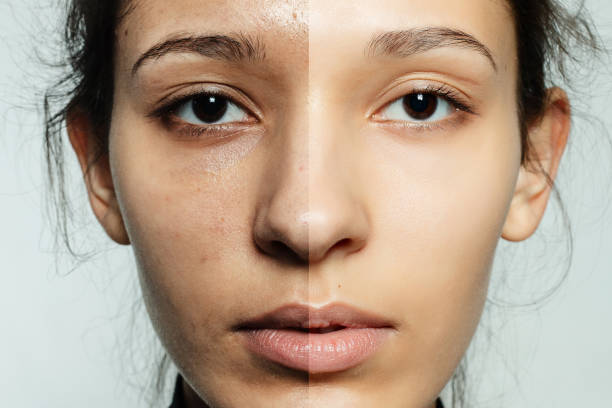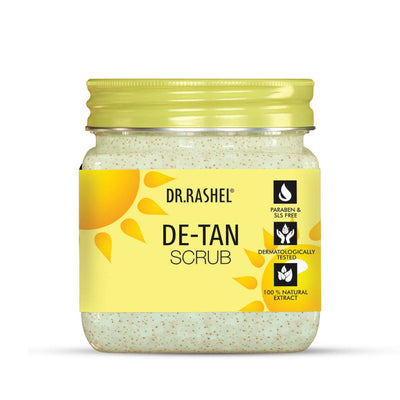.jpg)
Table Of Content
- What is Uneven Skin Tone?
- Causes For Uneven Skin Tone
- Determine Your Skin Type
- Simple Steps to Achieve an Even Skin Tone
- Summing Up!
- FAQ’s
Frustrated about the dark patches on your skin? OR Are you fed up trying different remedies to remove those dark spots?
These dark spots surely are tough to remove but not impossible to remove. But here the question arises: What to use for uneven skin tone treatment?
Well, Worry No More, this blog covers everything from causes to cures for you to achieve a brighter and even complexion in the skin.

What is Uneven Skin Tone?
Uneven skin when there are dry patches, blotchiness, and dark spots on the skin. It is darker than your natural skin tone and causes discoloration on the skin. This usually happens due to a trigger in a substance in our body called melanin. Melanin is responsible for skin tone, excess melanin production in the skin leads to uneven skin tone.
Causes For Uneven Skin Tone
- Pollution: Smog, gas emitted out of industries, dust particles, and other environmental pollutants damage the skin and trigger melanin production causing dark spots leading to uneven skin tone.
- Acne Marks: Another reason for uneven skin tone can be damage to collagen tissue during the process of healing wounds and acne. This causes a mark to appear on the skin which gets darker over time.
- UV damage: UV rays are one of the most common reasons for uneven skin tone. If the skin is exposed to the sun unprotected, it stimulates melanin production and causes pigmentation which increases the appearance of dark spots and dark patches on the skin.
- Hypopigmentation: Hypopigmentation is a condition where there is less melanin production in the skin which turns the skin white and causes light patches to appear on the skin. This could be because of genetics, aging, or due to any medical condition.
- Aging: As we grow old, there is less collagen production and cell regeneration is low which weakens the skin barrier and the healing process becomes longer. This leads to the formation of age spots on the skin causing uneven skin tone.
Determine Your Skin Type
Dry Skin
Dry skin is caused due to a lack of moisture and the affected area looks patchy, red, and discolored. Whereas oily skin has excess sebum production and is more prone to acne, acne can leave a mark or scar behind which can cause the appearance of uneven skin. Combination skin is both oily and dry resulting in a rough and dark pattern on skin. Sensitive skin can cause skin inflammation which results in uneven skin tone and texture.
Simple Steps to Achieve an Even Skin Tone
Eliminate the Impurities Using a Cleanser
Removing the dirt and impurities from the skin is your very first step towards achieving an even skin tone. An effective cleanser that contains charcoal and vitamin C will efficiently detoxify your skin and provide a clean surface for other products to penetrate deeper into the skin.
Gentle Scrubbing is Essential
Using a scrub helps to remove dead skin cells from the skin, unclog pores, and rejuvenate skin cells. It reduces suntan from the skin and reduces the appearance of acne marks and scars. A great natural ingredient like coffee can help you achieve such wonderful benefits.
Carry Out a Spot Treatment Using a Serum
To treat dark patches on your skin it is crucial to have a serum that reduces melanin production. Ingredients like kojic acid, niacinamide, and arbutin work fantastically on the skin, reduce pigmentation, and lighten the appearance of dark spots. They also help brighten the skin and maintain skin elasticity, providing a youthful radiance.
Nourish Your Skin Using a Moisturizer
Moisturizer is like an antidote for your skin, it hydrates, moisturizes, and nourishes your skin. It heals damaged skin cells and delivers essential nutrients to the skin. A moisturizer containing vitamin C boosts collagen production in the skin and regulates the production of melanin in the skin, lightening the skin tone, and promoting even skin tone.
Add a Shield On Your Skin
Protecting your skin is the most important thing in skincare. Sunscreen adds a protective layer to your skin to safeguard it from harmful UV rays that can trigger the production of melanin in your skin. It contains SPF that either absorbs or reflects UV rays depending on what kind of sunscreen you use. It creates a barrier between the sun and your skin, preventing hyperpigmentation and dark spots.
Summing Up!
To wrap it up, it is vital to protect your skin from all the environmental stressors to achieve clear and bright skin.
A proper skincare routine not only promotes even skin tone but also boosts confidence and self-esteem. Along with treating your skin with skincare do not forget to follow a healthy diet.
FAQ’s
Does niacinamide help with uneven skin tone?
Yes, niacinamide helps to reduce the melanin production of the skin and promote even skin tone.
Can you reverse your uneven skin tone?
Yes, with a proper skincare routine and the right treatment one can reverse uneven skin tone.
How to reduce melanin production in the skin?
A serum, moisturizer, and sunscreen containing vitamin C, arbutin, and niacinamide helps to regulate melanin production in the skin.
What ingredient is good for uneven skin tone?
Vitamin C, kojic acid, and niacinamide are great ingredients to treat uneven skin tone.
Is uneven skin tone permanent?
Uneven skin tone is not usually permanent, it can fade away with proper treatment and care.








